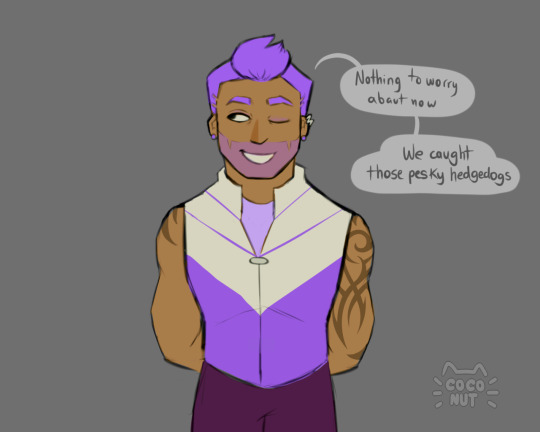#stone number one
Text

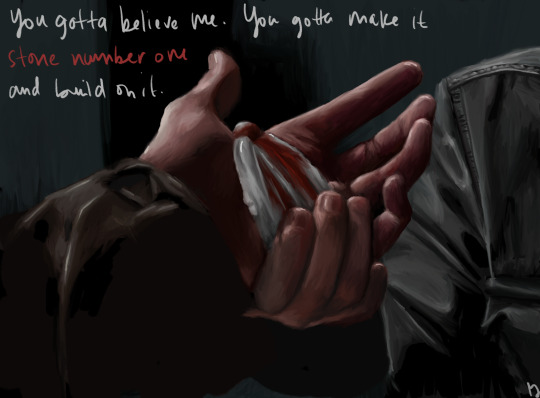
I am your flesh-and-blood brother, okay? I’m the only one who can legitimately kick your ass in real time. You got away. We got you out, Sammy.
digital painting, 15 hours - drawing video below
song: this is me trying by taylor swift
of course i forgot to start recording drawing a significant chunk of the second painting's hand today -_-
#supernatural#myart#digital painting#spn#spn fanart#sam and dean#hands#spnart#spn art#spn 7x02#art process#drawingvideo#drawing video#sam winchester#dean winchester#stone number one
384 notes
·
View notes
Text
hi yes here’s your reminder that sam winchester based his entire sense of reality around his brother. that’s how much he trusts him.
213 notes
·
View notes
Photo
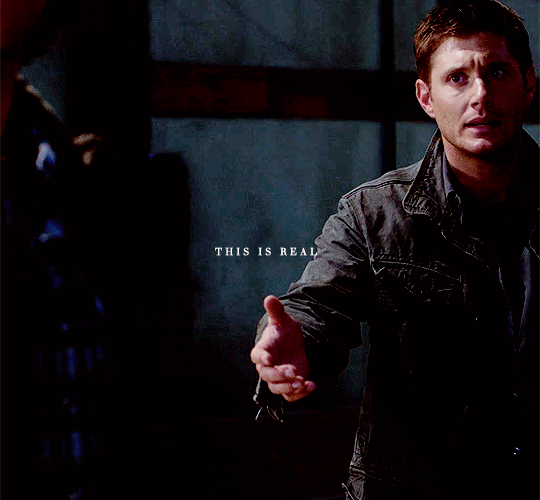
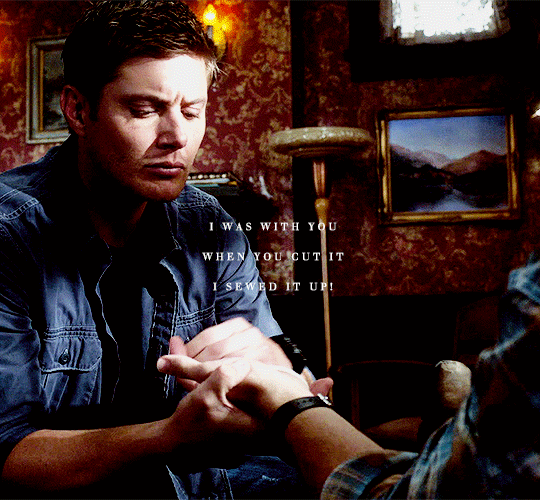
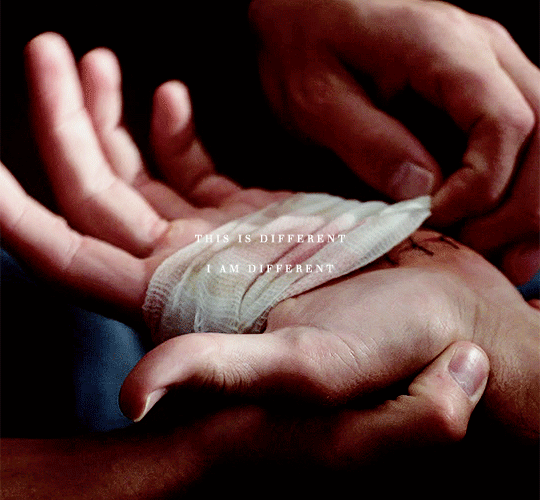
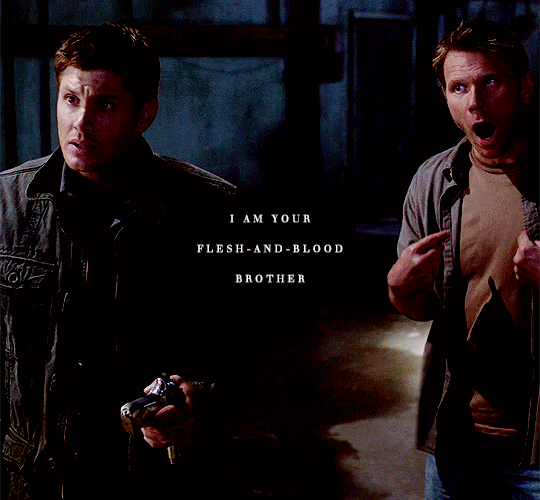
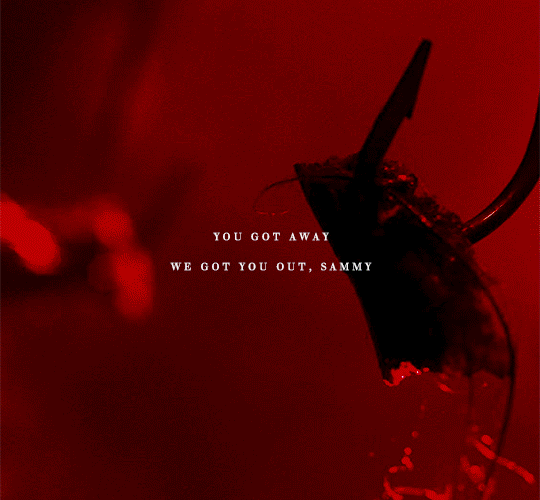

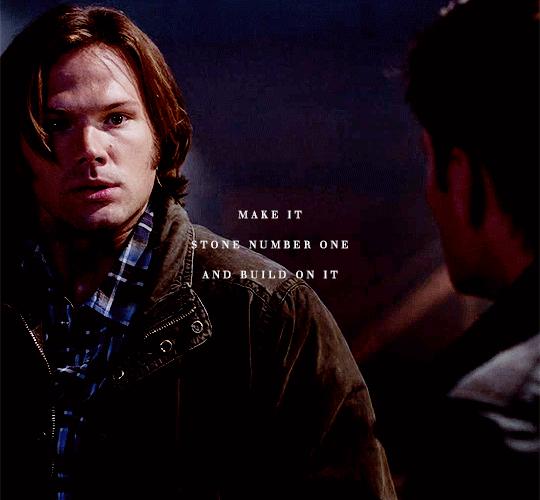
Look at me. Come on. You don’t know what’s real? Look man, I’ve been to Hell. Okay, I know a thing or two about torture. Enough to know that it feels different. Than the pain of this – this regular, stupid, crappy this.
#SPNWEEK Iconic lines
#spnedit#samedit#samdeanedit#spnweek#supernatural#sam winchester#dean winchester#a gifset of this scene convinced me to start watching#(well. that and gabi's pestering)#so uh. full circle etc#sam's handwound will always be a 3rd character to me#you and me#7x02#**#a lot of people got it worse#stone number one
854 notes
·
View notes
Text
Better things
for @wincestwednesdays week 1: americana (never mind it being a week+ late)
They drive out at midday, down an old logging road bordered by No Trespassing signs faded to a papery yellow and pock-marked with bird shot. They pass a pull off, and Dean catches a glimpse of a gravel beach on the edge of a glistening lake as they head deeper into the woods. It’s hot out for September in the Northwoods, and humid, too. Dean’s got sweat beading down the back of his neck by the time they're rummaging through the trunk for their gear.
“Should have brought the last couple beers,” he grumbles, swatting at the mosquito probing at his shoulder. He can picture them sitting in the motel’s mini fridge and half wishes he could go back and crawl in with them.
Sam rolls his eyes. “It’s a hunt, not a party.” Which is dumb, given the number of times they’ve pulled beers from the cooler while they were both still bloody. Sam swings his backpack over his shoulder, and it clinks suspiciously, but Dean doesn’t say anything, just makes a note and pulls out the map.
Dean hates these doghair forests that pop up after logging--young trees growing so thick together you can’t see through them for shit--but they stick to the map and Sam’s compass and soon enough it opens up into older forest and then to a clearing. One side borded by reeds, a break opening to the water’s edge on the far side of the lake Dean glimpsed earlier, and in the shadows of the trees on the other side, the remnants of an old log cabin slouch in the shade.
He catches Sam’s eye, pulls out the EMF reader, and they get to work.
It goes as quick and easy as it can when you have to locate and dig up an unmarked grave. It’s getting dark by the time Sam dodges a flying tree branch and drops the lit book of matches into the grave. There’s the satisfying fwoosh of the gasoline catching and then the even more satisfying burst of light as the ghost flames out, stringy white hair falling in burning clumps and disappearing before they hit the ground.
“Never gets old,” Dean says, and grins at Sam as they catch their breath. He stands from where he's crouched and his lower back twinges. He groans and rubs his knuckles in to the worst of it.
"Well, somethings get old," Sam says, flashing Dean a smug little grin as if he isn't graying at the temples, as if they weren’t both bitching when they were knee deep in the grave. It’s rude is what it is and Dean is not letting Sam score this point uncontested.
"Shut up and give me my beer," Dean says and grins when Sam freezes, caught out, and then breaks into that dorky, sheepish smile he gets sometimes. But he heads over to his bag and pulls out a motel towel wrapped loosely around the beers Dean heard clinking around. He loves being right.
The distant crunch of gravel and the slamming of car doors snags Dean's attention. The grave is still burning, making them way more visible than he'd like, the last thing they need is someone getting curious.
He walks over to the shore and sees a car pulled up on the gravel beach he spotted earlier. The doors are wide open, headlights on, lighting up the water’s edge in the evening gloom. Someone crosses through the beams, dragging what must be a whole damn stump behind them. And if Dean had to hazard a guess, theirs won't be the only fire burning for long. Which means they've got nothing to worry about.
The breeze has died down since the sun set, which means there’s nothing to keep the mosquitos away. One buzzes past Dean’s ear and he tries to swat at it discretely. He can handle almost anything, but he’s got zero tolerance for itching, and no desire to give Sam--who pretends to be unbothered by mosquitos even though he hates them as much as Dean--another in to poke fun at him.
Sam comes over, hands Dean an open beer and they settle in to watch the wood pile grow. There's three guys and they’ve got to be teenagers, judging by the sheer size of the branches they drag over and the truly frightening amount of lighter fuel they douse the pile with.
"Too much," Sam says, shaking his head.
"Gonna lose an eyebrow."
Another car pulls up beside the first and three girls pile out. "Ladies!" one of the boys calls, voice carrying across the lake. "Your bonfire awaits."
He lights a match with a flourish and drops it, and just like Dean knew it would, the whole pile explodes into flame with a roar. It sends the boys diving for cover. Everyone turning back to stare at the jumping flames. The shocked silence soon turns into giddy laughter, as the fire settles into a steady blaze.
"Hey," Sam says and the half-buried humor in his voice sets Dean's alarm bells blaring, "remember that time--"
"No. Nope. No idea what you're talking about. Drink your beer." Dean absolutely remembers the first time he used too much lighter fluid. Only he wasn't lighting up a bonfire, and it wasn't a girl he was trying to impress.
Dean can hear Sam’s quiet laughter gusting across the mouth of his beer bottle.
"Sam," Dean warns, but Sam grins bigger, and tucking it behind the lip of his beer isn't doing a thing to hide it.
"What? I'm just drinking my beer."
“Right,” Dean says, pursing his lips to hide the way he wants to laugh, too.
Across the lake, there's a high-pitched squeal as one of the guys throws a girl over his shoulder and marches into the shallow water. The squeal turns into a shout as he tips her in, but a second later he goes down, taken out at the ankles.
“Ah, young love,” Dean says and elbows Sam who just huffs and shakes his head.
“What, you too good for a little end of summer fling?” Dean turns to look at Sam, catches him picking at the edge of the label where its gone soggy with condensation.
“Nah,” Sam says with a shrug, “guess, I’ve just outgrown it.” Then he looks at Dean, and he's still got a smile hanging around the corner of his mouth but it's different now. It's the kind that makes the world go a little quiet, makes Dean wonder how the hell they got here, after everything. "There's better things.”
Maybe there’s a world out there, in all of Chuck’s failed drafts, where Sam looking at him like that doesn’t make Dean feel like he could never want anything else, but it isn’t this one.
“Yeah, I'll drink to that,” Dean says after a moment. And if he has to clear his throat, Sam doesn’t say anything, just holds his bottle out for Dean’s to clink against.
Laughter drifts across the lake. The fuzzy sound of Tom Petty playing on a distant car radio, hot summer air turning cool in the moonlight, and everything is right as it should be.
“Gonna run down the battery,” Dean says as he steps up into Sam’s space, watches Sam’s smile go fond.
“Amateurs,” Sam says and lays a heavy hand on his waist.
Dean loves the way Sam’s eyes darken, loves the sharpness of his jaw, the curve of his neck he leans--wait a damn minute. There’s a mosquito on Sam’s neck, right by the collar of his shirt.
Dean acts on instinct, smacks him, hard. Sam jolts in surprise, stepping back and covering his neck.
“Mosquito,” Dean says by way of explanation and turns his bloody palm to Sam. “You’re welcome.”
Sam pulls a face, dodges back when Dean tries to rub his bloody palm clean on his shoulder.
But that’s not the end of it. They’ve clearly been discovered by a whole damn swarm of mosquitos because suddenly they’re everywhere. There’s a prick on the back of his hand and Dean smacks at it with side of his beer bottle, perfectly good beer fizzing over his fingers and splattering across the ground.
“Frigging mosquitos!” Dean says, a little louder than he should while Sam is busy swatting inelegantly at the air around his face. Sam catches his eye and they both freeze for a second.
“Wanna get the out of here?” Sam asks.
“Hell yeah,” Dean says, and downs the last of his beer.
If they grab their gear and sprint for the Impala, no one needs to know. It’s just them after all.
#wincest wednesdays#wincest#happy wincest wednesday#this didn't turn out how I wanted#but I finished a thing#and that has it's own merits#mosquitos suck#it is a universal truth#my fic#stone number one#post 15x19 golden years
60 notes
·
View notes
Text

This deserves its own post!! The wonderful @mieletthe animated Djating Sjim Fjord for us all to enjoy, so please enjoy this sweet sweet confession scene
#exandria's hottest boy. number one contestant on the bachelorette (nicodranas edition)#fjord stone#my art#and mieletthe's art!#critical role#fjord's story would be a fantastic dating sim route tbh
406 notes
·
View notes
Text
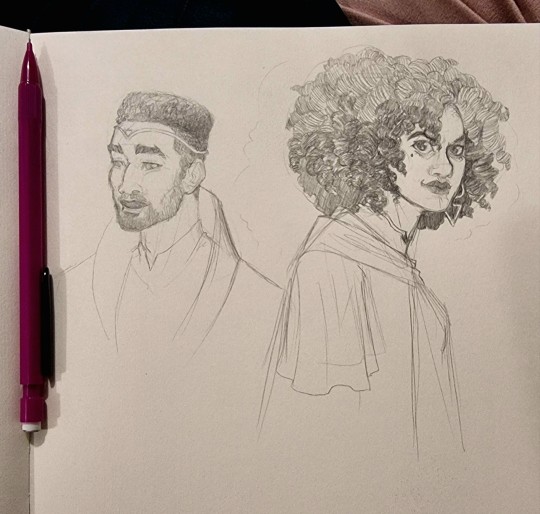
I didn't realise it was World Beyond Number's first birthday until the livestream popped up so I did some last minute doodles of the wizards, Soft and Stone, to celebrate! Stone's face isn't as round as I'd like it, but it's not bad for a first try
#wbn#wbn fanart#worlds beyond number#worlds beyond number fanart#twtwatwo#ahmankedberiket#the wizard the witch and the wild one#the wizard stone#the wizard soft#ahman kedberiket#shundri newell#character design#sketches#fanart
111 notes
·
View notes
Text
Statistically, you're only going to kill one bird per stone. The chicxulub asteroid, which killed 96 million dinosaurs, was an outlier which should not have been counted.
#there were probably way more dinos than that but i couldn't get any specific numbers#they just kept listing different cretaceous species#smh#dinosaurs#two birds with one stone#killing two birds with one stone
1K notes
·
View notes
Text
a lot of folks have asked why Ame didn’t drop Sly’s name because then surely Steel would have been more amenable
but I’m 99% sure that would have made things so much worse
Stone was in the college of Diviners
Moved there after being kicked out of the Citadel. One of the few to be allowed back in at all
Steel speaks of prophecies and traps like she’s speaking from experience. There’s a fear there.
if I’m right, Steel hates Sly. Because Stone heard a prophecy, one that led her to send her daughter to a witch’s home for the summer, one that put an amulet around Suvi’s neck, one that meant Soft and Stone couldn’t, wouldn’t wait for Steel on that first mission they went on without her
the last mission they ever went on
and Steel doesn’t want that to happen to Suvi, to Ame. She wants to protect them from the trap.
Ame dropping Sly’s name would have certainly added more context and possibly led to a lore drop
But i def don’t think it would have helped her case
[ETA: i got the timing wrong. Stone was Diviner then Abjurer. Still doesn’t stop me from thinking Stone and Sly cooked up their plans from the start and/or were in cahoots]
#worlds beyond number#the wizard the witch and the wild one#worlds beyond number spoilers#the wizard the witch and the wild one spoilers#wbn steel#wbn sly#stone wbn#wbn soft
53 notes
·
View notes
Text
I was discussing this in the server but I feel like sharing it here too.
I don’t feel like we talk about the umbrella scene enough regarding Adrien’s point of view and that’s a crime! People argue about whether the feelings he develops for Marinette are romantic or platonic in this moment but I believe that isn’t important.
What’s important is how he’s opened his heart to this stranger who assumed the worst of him and in return created a unique, unbreakable connection that he’s always dreamed of having. A friend! It was at this moment that he opened up his heart to Marinette and kept it open, evident in how he’s always tried to initiate conversation with her or interact with her with baby steps. The admiration he has of her starts from the umbrella scene and hasn’t stopped growing since that day.
I feel like it’s really beautiful.
And I wish more people in the fandom appreciated it too.
#miraculous ladybug#miraculous ladybug and chat noir#adrinette#adrienette#adrien agreste#marinette dupain cheng#a lot of early fandom fanfics often wrote adrien as quite dismissive or uncaring of marinette which always irked me#because from the start and even throughout season one#you can tell he clearly respects her and admires her!!!! like hellO?? HE ASKED FOR HER SIGNATURE AFTER SHE DESIGNED JAGGED'S STONE'S ALBUM#and he was moooooooore than ready to kiss her during nino's film#and i can go on and on and on#but anyways regardless of what kind of brand of loving feelings he developed in the early season#he became marinette's number one fan since DAY ONE#this hotheaded and pretty girl assumed the worst of him because he's associated with her bully who tormented her for years#AND YET#she stayed and LISTENED to him talk#she gave him a chance and heard him out!#and accepted the umbrella he gave her!!!!#how can he not feel so happy and relieved and excited whenever he's around her after that?????
226 notes
·
View notes
Text
i hadn't relistened to the children's adventure since before we got the knowledge of how namecloaks work
so i'm just now realizing that, while suvi hears her parents call each other soft and stone, they are saying each other's true names
#i'm FINE#i'm not going to cry i'm not going to cry#(narrator: they were likely going to cry)#worlds beyond number#wbn pod#the wizard the witch and the wild one#wwwo#wbn: www#the children's adventure#suvirin kedberiket#suvi wbn#the wizard soft#ahman kedberiket#the wizard stone#shundri newell
35 notes
·
View notes
Text
“Philosophical and Personal Musings on the Wizard Stone and the Axiom of Proliferation” – An Essay and Divinations for Arc 3 of “The Wizard, the Witch, and the Wild One”
From the Desk of The Bard Bullseye
Happy Birthday, Worlds Beyond Number!
Spoilers abound! This is an essay discussing the actual-play podcast “The Wizard, the Witch, and the Wild One” from the fine folks at @worldsbeyondpod It is an expression of my analysis of and engagement with the content of the second arc of the show and also contains some speculation about future plot and current themes. These interpretations are my own, include some reflections on my personal philosophy, and are written in a mostly academic style of writing (be warned, it’s around 3,000 words!). If you do read through it, I hope you find my points interesting and thought-provoking regardless of whether or not any of it turns out to be true (and I have done my level best to adhere to the facts of the story thus far, with transcript pages and timestamps cited when available/applicable).
Abstract (TL;DR, or I ain’t reading all that, but I’m happy for you):
The Wizard Stone’s discovery that the Axiom of Proliferation is untrue has major implications for the overarching story and the direction of the next arc. Herein, I explore my reaction to this moment in Episode 19 and how my experience and own philosophy potentially align with Stone’s. Then, I examine the logic of her argument and its implications for the greater worldbuilding in Umora. Specifically, there is a fundamental problem with the way that wizards are using the lingua arcana that is affecting the link between the Spirit and the Mortal worlds (i.e., the “greater binding”), and this is leading to detrimental effects. This, I believe is ultimately what Grandmother Wren (and now Ame) and Coven of Elders (and possibly the Man in Black?) are concerned with, though they have come to vastly different conclusions about who is at fault and how to solve this problem, which are yet to be revealed in the forthcoming third arc (see footnote 5).
Introduction
Something has piqued my interest and scratched a deep philosophical itch for me in the second arc of “The Wizard, the Witch, and the Wild One.” While the first arc introduced the characters, explored ideas of ‘quest fever,’ and masterfully wove in lore and character motivations for reclaiming Eursulon’s sword, Wavebreaker, the second arc has expanded upon the characters and their relationship to the greater philosophy of the Citadel and Umora.
I don’t usually speculate where stories might go next or craft my own fan theories. Especially for ongoing projects (i.e. TV shows, actual plays, books in a series, etc.), I tend to be along for the ride, and I spend time analyzing the story being told and the characters within. And rarely do I put these thoughts to paper, at least not coherently; I am more likely to ramble endlessly to a friend or lurk on Discord for others’ opinions, chiming in occasionally. However, I have noticed some things brewing in this arc that I wish to discuss at-length and even speculate upon: my perspective and analysis of the philosophy of the Wizard Stone, and the possible implications for the forthcoming third arc.
I don’t often see myself in stories. Not to say that I don’t see myself or parts of myself represented in media: i.e. demographically, socially, politically, etc., but rarely do I find a specific character or character motivation that ‘snipes through the duplex door’ where I go “oh shit that’s me” or “I relate to this on a deeper level.” This happened to me in Episode 19, when Suvi is investigating the records of her mother’s early time in the Citadel: her expulsion from the College of Divination and readmittance to the College of Abjuration because she had accused one of her professors of “treason against magic itself.”
Upon her dismissal from the Citadel, Stone wrote a dissenting missive to the Archmagi of the Citadel regarding one of the three metaphysical axioms, the Axiom of Proliferation, and how this particular axiom “does not describe any actual truth of the lingua arcana, nor does it more broadly describe any facet of the greater binding” (Ep. 19, transcript p. 12). She goes on to posit that not only is it “pure intellectual technology,” but that its continued acceptance as fact is a “danger to the future of wizardry” and “[a] stain on the face of magic itself” (Ep. 19, p. 12). An axiom in this context is described as “simple… laws that are given to young wizards about broad truths of spell casting in general… that are true across spells [and], … different schools of magic” (Ep. 19, p. 13). That is, “the Axiom of Proliferation is essentially that the more times a spell is written down … the weaker the spell becomes” (Ep. 19, p. 13).
An axiom as defined in philosophy is a statement that is self-evidently true and serves as a starting point for reasoning. Therefore, any argument against its truth would call into greater question the philosophical foundation of the Citadel itself. If Stone’s claim that this was not a true axiom had not been dismissed swiftly and discredited, it is possible (though highly unlikely, given the power of empire) that this would have led to a redefinition of the philosophy of wizardry in Umora.
This is what struck me like a bolt of lighting while listening to this episode. I did almost this exact thing when I was in grad school!
Stone is… me? Faulty logic and its effects
As part of my master’s degree, I took a philosophy seminar on bioethics, which covered some polarizing subjects and more fringe points of view. Most of these topics cannot be directly studied or supported by scientific evidence, so the conversation and academic debate is largely conceptual or theoretical (i.e., conducting research to investigate these ideas have varying states of legality and moral acceptability) (see footnote 1). This course was excellent and a bit out of my comfort zone, but it challenged me to think critically about fundamental logic and accepted ideas that often go unexamined until they are taken to the extreme. At one point in the semester, we were discussing a particular topic and the current state of debate surrounding it. Immediately, I was perplexed by some of arguments made to justify it, and at first, I didn’t have the language to express why. Much like Stone, I found myself screaming (internally) “you’re all idiots!” or “you’re missing the point/the bigger picture!” or “that’s not how that works!” Essentially, I had arrived at the conclusion that if this idea were to be implemented broadly in society, it would likely have major negative ramifications, and furthermore, not even achieve the desired and purported effect that they were arguing for!
Eventually, I figured out what the underlying problem was: a logical fallacy inherent and unidentified within the current debate. Since scholars had just accepted the argument at face value and moved on, most of the debate was concerned with its future implementation or theoretical follow-on effects on individuals and society at large. I did find some existing papers that danced around the idea of fallacious reasoning (i.e., that the theoretical benefits were greatly exaggerated, if not a zero-sum game, or that the negative long-term effects may outweigh the short-term benefits), but none named it specifically or even examined the logical argument the entire debate was predicated on. So, for my term paper, I researched and wrote about this fallacy, and in it, I discussed how the discovery and acknowledgment of it would reframe the debate and perhaps even bring about reform to existing systems!
In the process of writing and researching, I felt incredibly isolated intellectually (this was also peak-COVID so that didn’t help either). Now that I had put the pieces together, it seemed quite obvious to me, but it was difficult to find supporting evidence or other similar arguments to mine (even if they weren’t breaking the logic down so specifically). Was this thing I had reasoned actually true? Why had no one pointed this out before? What if I’m wrong? What if they’re right and I’m a fool for daring to challenge them? What does my professor think? They’re an expert and approved the topic, so I know I’m not entirely off-base, but do they agree with me? I knew that if I wrote a strong, supported, and persuasive argument, that I couldn’t fail, but I deeply cared whether or not I was actually right. It was also probably one of the first times that I wrote with passion (and specific planning ahead of time!), rather than churning out yet another good-enough research paper (that I may or may not have written days ahead of the deadline or the night before).
Thankfully, unlike Stone, my fears that I would not be taken seriously, or worse, told that I was flat out wrong (and be silenced) did not come to pass—my professor agreed wholeheartedly with my argument that this fallacy is pervasive in the current literature. (Though I feel must disclaim that I still could be wrong in some other aspect of my argument, and that simply arguing the existence of a fallacy can be treacherous! In philosophy, no one ever has the only or complete answer—if they claim to, they are either lying or ignorant.) As part of the course, we did a mock peer review in class and my professor sent us further feedback on our papers after we submitted our initial draft of the term paper.
One particular piece of feedback stands out to me upon reflection and comparison to Stone’s experience and the philosophy of wizardry. It said something along the lines of ‘We think that is a very admirable and unique take on this subject. No one found any fault in your logic; however, it is important to consider the practical implications of identifying this fallacy.’ Point taken, of course, that the mere identification of a flaw in logic is not the end of the conversation—it is merely the start of a new discussion and opportunity to surface new arguments.
In my case, the identification of the fallacy was the concrete thing I felt I could verifiably yell about (academically) to explain why I disagreed so vehemently with current literature (and some truly wild propositions made by certain scholars). Of course, one should not commit the ‘fallacy fallacy,’ which is that simply pointing out a fallacy invalidates the argument. Instead, it was a means to discuss practical implications: some less harmful methods, some overlooked existing solutions, and to pull knowledge from other related disciplines that had not yet been considered because this fallacy had yet to be identified (see footnote 2).
The philosophy of Stone’s accusation of ‘treason’ and treatise to the Archmagi
In listening to and reflecting upon this episode and the conclusion of the second arc, I wonder if Stone felt similarly to me: that she had a fundamental disagreement with the way that wizards (and the Empire) conduct magic. I wonder if she learned about the Axioms and something didn't sit right with her, so she dug into the philosophy or history of it. Moreover, I find it particularly striking that her original specialization was divination. Although it has not been stated outright, I think it can be plausibly inferred that Stone divined some kind of knowledge about the fundamental ‘wrongness’ of current wizardry and the disastrous follow-on effects it would have. She may have been unable to fully convey her revelation in the moment, and so just shouted ‘treason against magic’ at her mentor. As was the case with me, the Axiom of Proliferation was just the most concrete thing that Stone could point at to explain herself.
But beyond my own biases and affinity for Stone, it follows that she may well have examined or done a proof on the Axiom of Proliferation which led to her discovery that the premise of the Axiom was false. Let’s examine the argument that Stone may have made (and the one that Suvi may have done a poor proof of, by her own admission). The argument is as follows:
All Axioms of magic describe a truth about the fundamental nature of magic
The Axiom of Proliferation states that the more times a spell is written down (proliferated), the weaker the spell becomes, which is a truth about the fundamental nature of magic.
Therefore, the Axiom of Proliferation is an Axiom of magic.
This can be simplified:
All A’s have property B
C has property B
Therefore, C is A
This does not necessarily lead to a false conclusion, and while the argument may be valid, it may not always be logically sound, see for example:
All people are mortals.
John is a mortal
Therefore, John is a person.
In the Citadel’s view, there is no flaw here, because they teach (and presume) that the Axiom of Proliferation is true in the lingua arcana. Wizards, of course, are known by their secrets, so it follows that in their philosophy of magic, they would have some kind of justification for keeping magic limited to the select few. But, if one of the premises is false (in this case, premise 2), then this justification is in jeopardy. It stands to reason that Stone must have had serious evidence to declare that premise false, and as she was studying divination, it was likely a vision or prophecy of some kind. Presuming she is correct, then it also speaks to her incredible intelligence (although she did not have the social grace at 19 years old to deftly navigate this accusation) (see footnote 3a).
Although (as far as we know), Stone did not make another public ruckus about the Axiom upon returning to the Citadel, I don’t think this caused her to abandon the belief that the axiom was erroneous. Upon her readmission, she joined the College of Abjuration, specifically studying “counterspelling, dispelling magic, [and] sort of metamagic, … the magic of magic itself” (Ep. 19, p. 11). This might seem to be an odd choice for a backup specialization, but Stone’s issue with the Axiom and metamagic are deeply intwined philosophical concepts, as metamagic is essentially the equivalent to metaphysics in our world.
Wizardry and the nature of magic in Umora
Wizards are defined in Umora to be people that can use a “language of magic” the “lingua arcana” to cast magic, and importantly, that “they believe [the lingua arcana] is the language the universe uses to understand itself,” which was only coined about 250 years prior to the present story (Ep. 19, p. 16). At the end of the first arc, Suvi discovers from her father’s notes that the reflexive indicative, which was taught to her as a necessary component of the lingua arcana, is in fact entirely unnecessary for spellcasting. And further, Stone also doesn’t use the reflexive indicative, which is demonstrated through her unique casting of Mending in the very first episode. It is unclear so far in the worldbuilding (to me, at least) if the lingua arcana is the language the universe uses to understand itself, or if it is a construct used by people to explain, communicate, and more importantly cast magic in Umora (much like math and science are ‘constructs’ that describe the nature of our world, though the fact that it is constructed does not mean it is not true). If it is the latter, then there is likely to be forces at work, be it the components of spell casting (such as the reflexive indicative), the casters themselves, or others yet to be revealed, that are manipulating and restricting the nature of magic in Umora (see footnote 3b).
Thus, I would posit that there is some issue in the way that the restriction of the lingua arcana is affecting the “greater binding,” which is “the theory of magic, that magic is the interplay between the Spirit and the Real—or the Spirit and the Mortal” (Ep. 19, p. 14). Essentially, the lingua arcana describes the nature of the relationship between the Spirit and the Mortal world, while the greater binding is the metaphysical link between them. Stone all but confirms this in her letter to the Archmagi, that if the issue is left unresolved, it would endanger the future of wizardry (Ep. 19, p. 12).
Other pertinent wizarding history and context
Stone and Soft were also part of a group called the Acadator, which was dedicated to rooting out corruption and bad actors within the Citadel. We don’t really know too much else about them, the exact specifics of their philosophy, or if they still exist as a group (given that Steel and Eiorghorain were members). There is also some history surrounding two early wizarding groups pre-Citadel, the Antivoli and the Accordati, that had a philosophical disagreement about accepting the help of the Saraz Imperium for building the Citadel (specifically related to the sharing of magic), which led to a civil war called the Cataclysm of Carrow (Ep. 19, p. 16). In terms of timeline, the lingua arcana was coined in 1423, the term ‘wizard’ was coined in 1456, the Cataclysm of Carrow was in 1467, and three years later, in 1470, the Erien (Citadel) was built. The current story with the three protagonists is taking place in 1670, so it has only been 200 years since the Citadel was created, and the lingua arcana coined only 47 years prior to that (in less than a human lifespan).
Further, the creation of the Irulian Desert, the Erien, and the Citadel is a destructive history—wizards razed a verdant forest and turned it into a hot, unlivable desert with a miles high glass tower at the center. Additionally, the Wizards of the Citadel pool their magic beneath the Erien in an ‘Aerith,’ into which they deposit magical reserves and draw upon its combined strength when in crisis (see footnote 4). Mechanically, we see Suvi ‘donate’ unused spell slots at the end of the day.
We do know that Grandmother Wren’s cottage is located on top of a source of great magical power and serves as her sanctum. Wizards also use the towers of the Citadel as their sanctums, and I believe the following is speculation, as I do not think it has been canonized yet, but it is possible that the Aerith serves a similar purpose as a source of great magical power that previously belonged to the Spirits that wizards alone now use and control. This control is the key difference that may be contributing to, or even causing, detrimental effects on the greater binding.
The Witch(es)’s and the Wild One(s)’s perspectives
Additional evidence to support this theory of the Aerith's origins and purpose comes in Episode 23, when Eursulon meets the Man in Black and discusses their opinions on mortals, particularly wizards and their desire for control. Specifically, the Man in Black states, “that tower is the handle of a knife plunged deep into the heart of this world, a heart that is responsible for… a murder to the world of Spirits” (Ep. 23, 0:09:45-0:10:07).
Later, in a flashback with Mirara and Grandmother Wren, Mirara argues that “the world has burned before” (perhaps in reference to the creation of the Irulian Desert), that “[wizards] cannot be allowed to do this thing” (still unclear what that thing is), and the coven must make some kind of decision before it is too late (Ep. 23, 0:58:46-0:59:00). Wren pleas for another option, points this out as a false dichotomy, that they must not “be forced to choose between one slaughter and another,” and they should work to find common ground and coexist (Ep. 23, 0:59:07-0:59:33). Mirara retorts that she could never imagine the day that she would see “the will of wizards debase themselves” (i.e., that wizards would ever lower themselves from their current position of power) (Ep. 23, 0:59:39-0:59:52).
Wren then asserts a key point that correlates directly with Stone’s perspective: “There is nothing I have seen in the world of Mortals or of Spirits that shows me that there is a path that is wrong to tread” or anything that proves the pursuit of wizardry as inherently wrong (i.e., the lingua arcana), only those who “tread paths hurtfully, with cruel intention” (i.e., those abusing the lingua arcana for political purposes and imperial gain) (Ep. 23, 1:00:08-1:00:28). Wren also questions Mirara’s stance of wizardry as “an abomination against the natural order of the world” (Ep. 23, 1:00:40-1:00:47). Mirara then challenges her to consider her point of view and insists that even Wren cannot deny that “the poison of wizards does not spread so quickly as to choke the life from this world” (Ep. 23, 1:01:03-1:01:09).
My pure speculation and fan theory:
From this conversation, I postulate that Mirara and the Coven has taken an extremist and doomed perspective on the harm that is resulting partially from the Axiom of Proliferation (and perhaps the Aerith as well), while Grandmother Wren took a reformist stance. This would put her and her position as the Witch of the World’s Heart at odds with whatever plan the Coven intends to enact. Given what we know of the Witch Class and the other domains of the Coven, their plan is quite possibly violent, retributive, and holds little to no concern for the Mortals or people of Umora.
The third arc will begin with Ame’s meeting with the Coven of Elders at the North Pole, where they will attempt to destroy her station as the Witch of the World’s Heart. For all of the reasons above, I believe this event will connect directly to Stone’s declaration of “treason against magic itself,” but I will just have to (patiently) wait and see (see footnote 5).
Footnotes:
(1) I am well aware that I am being quite vague and obtuse regarding this subject and what specifically I was researching. Mainly because a) that’s not really the point of these musings, this is just some background info and context to explain my philosophy which is already longer than I would like, b) it would be impossible to do justice to an overview of this complex subject in an essay about something that resonated with me in a D&D podcast (and which does not engage with that subject directly, at least not in this context), c) I’ve already written a paper on this subject and am not interested in regurgitating it here, and d) Nunya Binyess (i.e. I could still be wrong about this fallacy and I’d rather discuss WWW than start a tangential IRL philosophical or political argument on this forum).
(2) Though on a deeper level, I partially disagree with the idea that I needed to account for the practical implications of the fallacy within the paper. I disagree that when challenging the fundamental nature of something (e.g., an erroneous argument, a misinformed policy, or an unjust system), there must be an immediate remedy or solution offered up. In my philosophical opinion, once a fallacy like that is identified for something that we hold to be fundamentally true, we need to sit in that revelation and undo the thought processes created by the incorrect assumptions. You cannot flip a switch and suddenly reverse all of the justifications that have gone into supporting a flawed, ingrained argument. To undo a pervasive, incorrect fundamental idea that has been implemented, internalized, or proliferated, first it must be fully examined for all its flaws, rescinded, and only then do we start from square one and think about practical changes (in a perfect world, of course, I am fully aware that the world does not work this way). I do often wonder about this reactive nature in society to demand immediate alternatives and solutions when norms are challenged, though I recognize this is a result of different lived experiences and worldviews. After all, this reactionary nature is true in Umora as well, and the wizards of the Citadel “tend to be a lot more about praxis and practice” (Ep. 19, p. 14).
(3a) Perhaps Stone rolled a nat 20 on some kind of intelligence check for the vision, but rolled a nat 1 on her Persuasion check against Sleep!
(3b) There is another essay I could write here about the history of science and empire (another grad school course) and the reflection of this in the Imperium, its taxonomy, and the (anti)-democratization of knowledge, but perhaps another time.
(4) Something that occurred to me when piecing together the Erien and the Aerith was the similarity to Morrow’s derrick that harnessed Naram’s power in the first arc. Both serve similar purposes as well, of generating magic and magical items. It makes me wonder if it was intended for the derrick to be Morrow’s poor attempt at recreating the glory of the Citadel, or if this is just a happy coincidence/connection between the arcs.
(5) I do want to briefly acknowledge the nature of improvisational storytelling in this situation, and that anything can change, be clarified, canonized, etc. at any point. This is partly why I don’t like to speculate much myself, because I trust the creators to tell the story the way they want to and follow the paths that appear, without projecting my own hopes or prescriptions when I listen to their wonderful creation that has been crafted with such care. It is also why my theory in the end is limited to the meeting with the coven- truly anything could happen at the beginning of the next arc, and whatever I might come up with is likely less interesting than what will happen. (NB: There is nothing wrong with fan theories or head canons! It’s just not usually something that interests me!) I merely saw a connection and through-line that deeply resonated with me in this second arc and felt compelled to write about it. Also, Worlds Beyond Number and WWW is just so fucking great, and it truly astounds me that this story is so deep that I have somehow written a 12-page essay analyzing essentially a 20-minute segment of one episode. I pray to Enzo that there are no grievous errors or spelling mistakes, but I wanted to post this on WBN’s first birthday! 🧡
#worlds beyond number#worldsbeyondpod#the wizard the witch and the wild one#www spoilers#wbn spoilers#wbn#wbn pod#the wizard stone#axiom of proliferation#philosophy#fan theory#chandri newell#soft and stone#the citadel#umora#fan essay#essay writing#food for thought#critical thinking#logical fallacies#coup crew
28 notes
·
View notes
Text
King of Attolia is still my favorite of the series but I don’t think I can accurately describe the joy I get from Sophos “Two Guns” Sounis and the “you shot the ambassador?” “you told me to shoot the ambassador!!” exchange
#i haven’t gotten to those parts yet in my reread#but i just got to attolia giving sophos Gun Number One and i’m just. god i can’t wait#this book in general is *chef’s kiss* so good#he is like that character class in blades in the dark that levels up by solving problems with violence#except he hates it and it changes him irrevocably but it is Necessary#he just wants to build stone walls and recite poetry and marry helen 😢#instead he gets. sounis.#(and helen 💞)#the queen’s thief#a conspiracy of kings#sepulchritudinous
30 notes
·
View notes
Text
spn fic: Flicker
A belated kris kringle mingle fic for the talented @thegoodthebadandtheart.
Relationships: Sam & Dean Winchester
Rating: Mature
Tags: Outsider POV, Canon-typical violence, Season 11
Length: 3,111 words
Summary: A snapshot of a hunt by the hunted.
Fic preview:
Headlights. The creak of a car door. It’s dark, cold. The brush of a fading feeling of recognition. Wait, where is she? In the woods. On the edge of a parking lot? Gravel and melting snow and walls of trees. Watching a tall man step from the passenger side of a car. A sleek, black beast. The headlights cut out. A second man joins the first.
Her body feels strange. Her head full of pressure and smoke. It hurts, or she thinks it does. Dull on the back of her head. Her ears are ringing. She smells pine and metal, copper or iron. Is that blood? She sees a flash of red splattered across concrete, like the memory of a dream. Something spikes in her heart—it’s beating so strangely—twisted up and tight like fear. Dread. Something happened. She needs help.
There's a moment of instinctual hesitance. Dangerous for a woman alone to approach men in the dark. But something happened. Something—
Help, she needs—she stumbles forward, says, “help,” quieter than she means to. She needs to yell it. Feels like it’s been bottled in her throat for hours, for days.
“Help.” Her voice is a croak, sounds—forced. She cringes away from the idea, sees a flash of her own face in a mirror. Flickering fluorescents and a smile that’s all wrong. How did she get here?
Continue on AO3
#spn fic#sam & dean#stone number one#season 11#blessed be the married years#longest thing I've written in 5 years and it was a gd struggle#my fic
15 notes
·
View notes
Text
gen will show off the tiniest sliver of exposed skin in official art and the entire fandom suddenly turns into victorians seeing an exposed ankle

harlot.
#to be clear i'm like. the number one person guilty of this lmao#and im not sorry!!!#dr stone#asagiri gen#dcst#gen asagiri
92 notes
·
View notes
Text
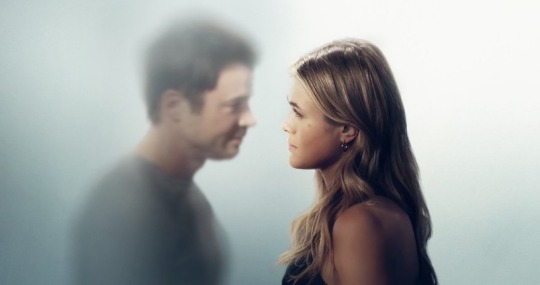
"every word, every smile, every touch, every kiss we have ever shared will be burned on my soul. i am yours, now and forever." -zeke landon
#manifest spoilers#manifest#zekaela#zeke landon#michaela stone#otp: under the stars#matt long being the number one zekaela shipper is everything#i love him for that
89 notes
·
View notes
